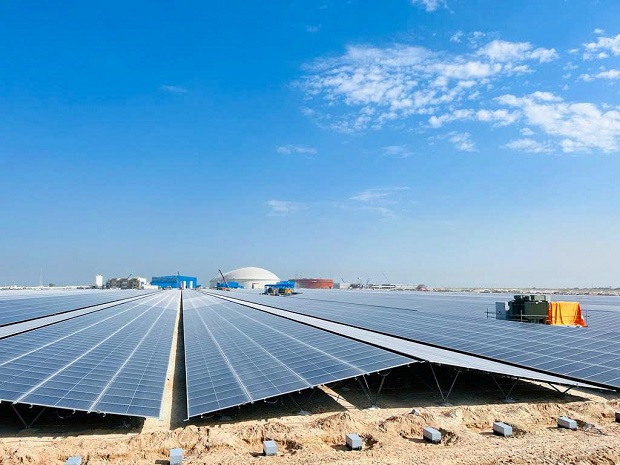Global solar module manufacturer Trina Solar has successfully powered a desalination plant at Jubail in Saudi Arabia. It deployed its cutting-edge Vertex N 700W+ series solar PV modules to undertake the work. The photovoltaic power station, boasting a substantial installed capacity of 45.5 MW, was recently integrated into the grid through the expertise of SEPCOIII, a subsidiary of Power China.
The Jubail 3A Independent Water Plant, located in the eastern city of Jubail, represents Saudi Arabia’s pioneering leap into large-scale integrated water desalination bolstered by solar energy. This innovative project is a landmark in the country’s sustainable energy journey, generating electricity to fulfill 20% of the plant’s daily energy requirements. Notably, it is projected to curtail carbon emissions by an impressive 60,000 tons annually, underscoring its pivotal role in the plant’s energy ecosystem.
Gonzalo de la Vina, President of Trina Solar EMEA, said, “Our collaboration on this remarkable project marks a milestone in sustainable energy solutions. By combining advanced technology with environmental stewardship, we are enabling Saudi Arabia to meet its water and energy needs while contributing to a greener future.”
Trina Solar’s Vertex N 700W+ series modules said that the key to the project’s success is to integrate innovative 210mm wafer technology alongside n-type i-TOPCon advanced cell technology.
These modules excel in efficiency, boasting a remarkable 22.5% efficiency rate while embodying features like ultra-low degradation, optimal bifacial power generation, and ultra-low operating temperatures. Aptly termed the “star of ground-mounted power stations,” these modules epitomize the future of sustainable energy.
Desalination and energy link
Desalination refers to the removal of salts and other minerals from salty water like seawater. It is considered an energy-intensity exercise. According to estimates,0.86 KwH of energy is used to undertake the desalination of 1 M cubic. meter of salt water.
Several countries have thought of using desalination to cater to the demand of the production of Green Hydrogen through electrolysis of water as the electrolysis of water for Green Hydrogen production needs water without minerals and impurities to prevent damage to its electrodes.
However, higher-cost desalination has proved to be a deterrent to this. Several smaller projects and pilots have been done for the desalination of water to make it fit for drinking water or for other purposes, but the associated practical challenges and costs involved proved as the main hurdles.
Saudi Arabia’s heavy reliance on desalination for 70% of its drinking water underscores the critical importance of projects like the Jubail plant. Utilizing seawater reverse osmosis technology, the plant contributes an impressive 600,000 tons of water daily, benefiting 3 million people and playing a crucial role in supplying water to Dammam and Riyadh. This initiative is pivotal in addressing the burgeoning water demand along the nation’s eastern coast.


